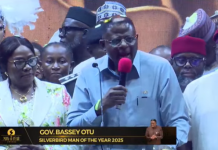The Museum of Fine Arts (MFA), Boston, has returned two historic Benin Bronzes to Nigeria, marking another milestone in the global effort to correct centuries-old injustices tied to colonial looting.
The emotional transfer took place on June 27, 2025, at Nigeria House, New York, where the bronzes were formally handed to Prince Aghatise Erediauwa, representing Oba Ewuare II of the Benin Kingdom. The ceremony gathered top officials from Nigeria and MFA Boston, underscoring the significance of the moment.
The two returned treasures — both dating back to the 16th or 17th century — hold deep royal and spiritual significance in Benin’s history:
A Commemorative Head, cast in terracotta and iron, symbolising royal lineage and ancestral memory.
A Bronze Relief Plaque, depicting two court officials raising ceremonial swords — an iconic example of Benin’s sophisticated bronze-casting tradition.
Both pieces were confirmed to have been stolen during the 1897 British punitive invasion, an attack that decimated the Benin Kingdom and led to the mass looting of thousands of artworks.
Archival records show the Commemorative Head surfaced in the London art market in 1899, while the Relief Plaque passed through British colonial officers before being sold by the Niger Coast Protectorate in 1898.
Both artefacts later entered the private collection of Robert Owen Lehman, who donated them to the MFA in 2013 and 2018, respectively.
For Nigeria, the repatriation is more than an institutional gesture — it is an act of cultural restoration.
Olugbile Holloway, Director-General of the National Commission for Museums and Monuments (NCMM), described the handover as the return of “a huge part of Nigeria’s history,” emphasising that these artworks embody the identity, resilience, and memory of the Benin people.
MFA Boston Director Matthew Teitelbaum echoed the importance of the moment, expressing personal satisfaction in returning the treasures to their rightful custodians.
Nigeria’s NCMM will now oversee the safe transport and preservation of the bronzes in Benin City. Meanwhile, the MFA continues to reassess the origins of other Benin pieces still in its collection. Earlier in 2025, the museum announced the closure of its Benin Kingdom Gallery, signalling a broader institutional reckoning with colonial-era acquisitions.
The Boston repatriation aligns with an international movement. Across Europe and the United States, museums are increasingly returning Nigerian artefacts — including the Netherlands’ historic handover of 119 Benin objects in mid-2025.
For Nigerians, each return is a reclamation of stolen heritage. As Holloway noted, these bronzes are “not just artefacts — they are part of our story, our struggle.”
With these two masterpieces now homeward bound, the call for global cultural restitution grows louder — and Nigeria’s long-scattered treasures continue their journey back to the soil that birthed them.
































